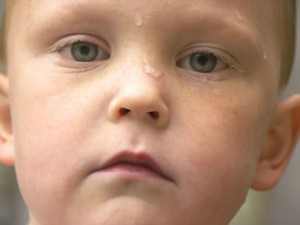Published: January 25, 2010
Children who are mixed-handed, or ambidextrous, are more likely to have mental health, language and scholastic problems in childhood than right- or left-handed children, according to a new study published today in the journal Pediatrics.
The researchers behind the study, from Imperial College London and other European institutions, suggest that their findings may help teachers and health professionals to identify children who are particularly at risk of developing certain problems. [continue reading…]
Published: January 14, 2010

Image: Fotolia
Researchers from the University of Malaga have created the ‘Inventory of Daily Stressors’, a method aimed at schoolchildren. According to experts, worrying about physical appearance, taking part in numerous extracurricular activities and being alone a lot are some of the factors that increase the risk of suffering from childhood stress. [continue reading…]
Published: January 6, 2010
Findings Suggest Abuse Is a Risk Factor for Chronic Headache
 Researchers from the American Headache Society’s Women’s Issues Section Research Consortium found that incidence of childhood maltreatment, especially emotional abuse and neglect, are prevalent in migraine patients. The study also found that migraineurs reporting childhood emotional or physical abuse and/or neglect had a significantly higher number of comorbid pain conditions compared with those without a history of maltreatment. Full findings of the study appear in the January issue of Headache: The Journal of Head and Face Pain, published on behalf of the American Headache Society by Wiley-Blackwell. [continue reading…]
Researchers from the American Headache Society’s Women’s Issues Section Research Consortium found that incidence of childhood maltreatment, especially emotional abuse and neglect, are prevalent in migraine patients. The study also found that migraineurs reporting childhood emotional or physical abuse and/or neglect had a significantly higher number of comorbid pain conditions compared with those without a history of maltreatment. Full findings of the study appear in the January issue of Headache: The Journal of Head and Face Pain, published on behalf of the American Headache Society by Wiley-Blackwell. [continue reading…]
Published: December 22, 2009
During the holiday season there is emphasis on happiness and well-being, particularly in children. But while happiness is a fleeting mood, psychological well-being underlies it. A new study which has been conducted at the University of Bologna and is published in the current issue of the Journal of Behavior Therapy and Experimental Psychiatry shows that brief psychological interventions in school may increase well-being and these results persist after 6 months. [continue reading…]

 Researchers from the American Headache Society’s Women’s Issues Section Research Consortium found that incidence of childhood maltreatment, especially emotional abuse and neglect, are prevalent in migraine patients. The study also found that migraineurs reporting childhood emotional or physical abuse and/or neglect had a significantly higher number of comorbid pain conditions compared with those without a history of maltreatment. Full findings of the study appear in the January issue of Headache: The Journal of Head and Face Pain, published on behalf of the American Headache Society by Wiley-Blackwell.
Researchers from the American Headache Society’s Women’s Issues Section Research Consortium found that incidence of childhood maltreatment, especially emotional abuse and neglect, are prevalent in migraine patients. The study also found that migraineurs reporting childhood emotional or physical abuse and/or neglect had a significantly higher number of comorbid pain conditions compared with those without a history of maltreatment. Full findings of the study appear in the January issue of Headache: The Journal of Head and Face Pain, published on behalf of the American Headache Society by Wiley-Blackwell. 